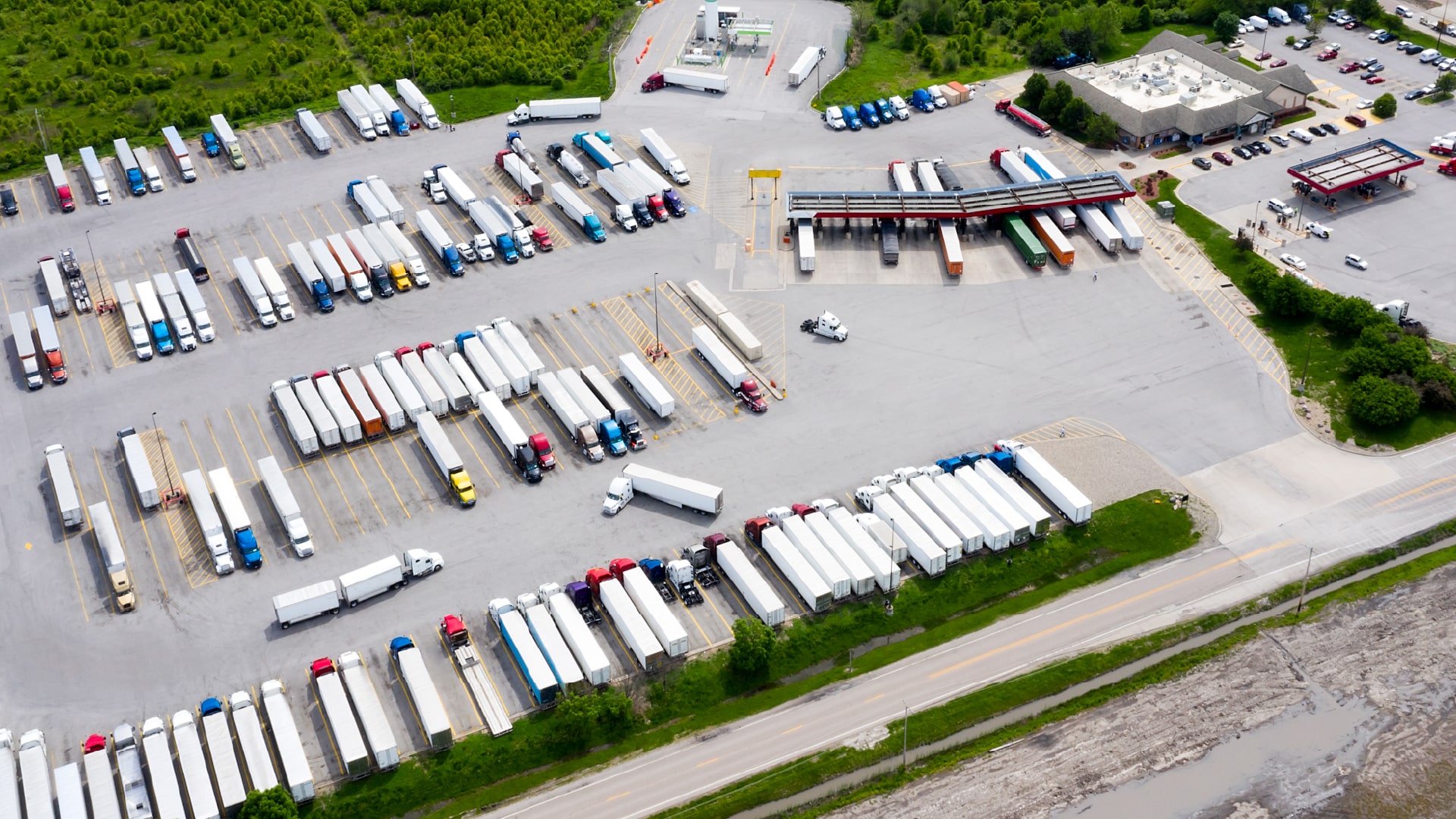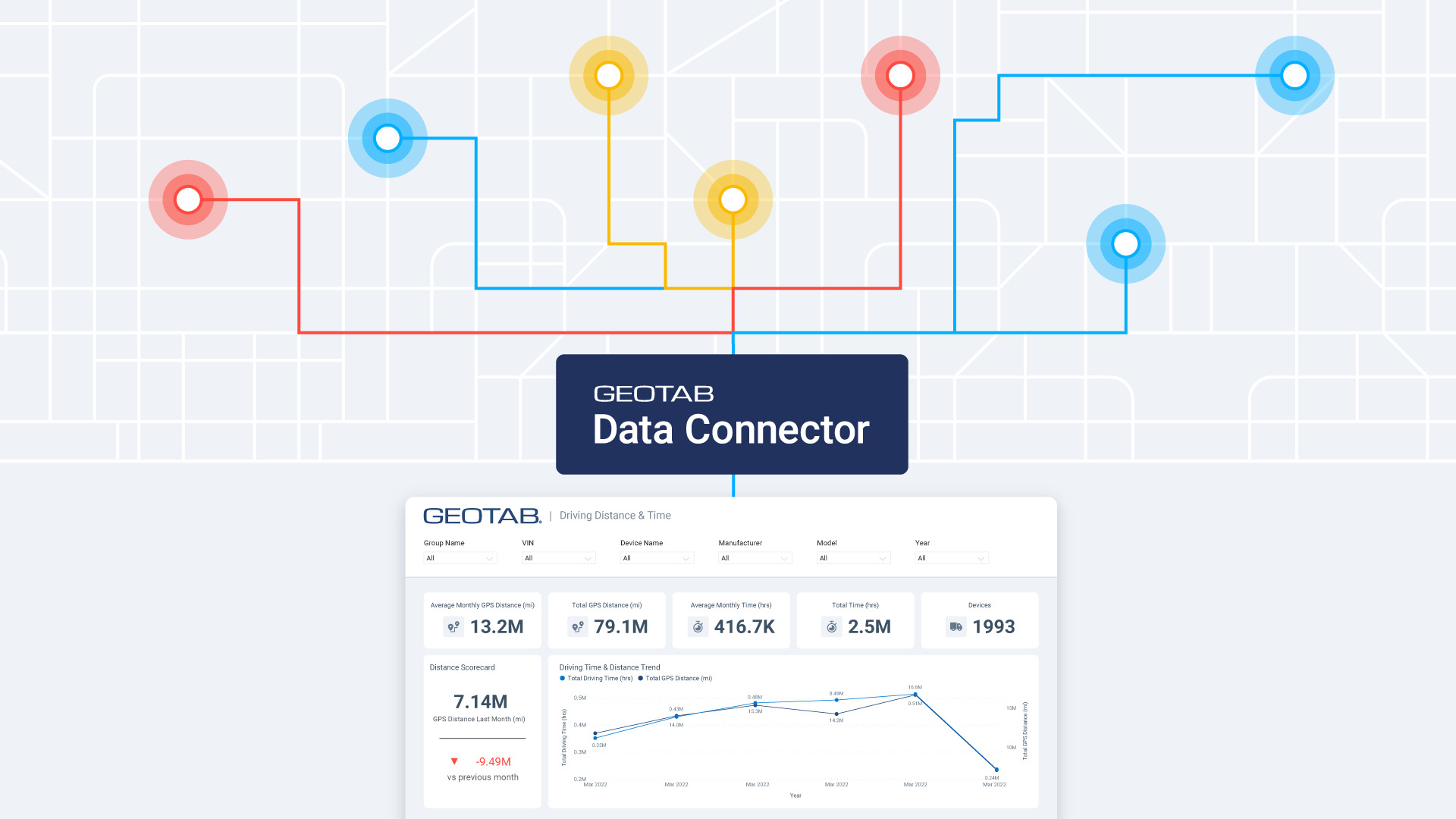IoT fleet management: Benefits and tips for fleet managers
Explore the benefits of IoT fleet management and tips to unlock real-time insights, cut costs and keep your drivers safe.


Key Insights
- IoT fleet management is the integration of internet-connected devices to collect and exchange data for real-time monitoring and optimization.
- GPS trackers, telematics sensors, engine/fuel monitors and auxiliary sensors deliver continuous data streams to cloud platforms.
- Predictive maintenance minimizes downtime, driver behavior monitoring boosts safety and fuel analytics drives cost savings.
IoT is transforming how fleets operate by turning raw vehicle data into real-time insights. From pinpointing vehicle locations through vehicle tracking devices to predicting maintenance needs, connected sensors and smart platforms empower you to boost efficiency, cut costs and keep drivers safe.
In the article, we explore how fleet companies can harness IoT data to optimize every mile, plus how to use the different types of IoT data.
What is IoT fleet management?
The Internet of Things (IoT) is a network of internet-connected devices you can monitor and/or control remotely. IoT in fleet management is nothing but using this technology to manage your fleet.
IoT devices have many applications in fleet management, such as collecting and transmitting data through telematics devices. The data comes from various sensors that you can install in any vehicle. The most well-known type of sensor is the GPS device, but there are many other types that can integrate with one another.
Types of IoT data and how to use it
There are five main categories of data that vehicles with IoT devices generate:
- Engine data, such as an engine’s RPM, coolant temperature, fuel levels, tire pressure and washer fluid level
- Fuel data, which includes a vehicle’s fuel level, rate of consumption and how often refuelling occurs
- Geographical location data from a GPS device, along with information on a vehicle’s speed and acceleration
- Driver behavior data generated based on a driver’s habits like harsh braking, speeding and drifting in the lane
- Auxiliary data, which covers any extra devices attached to a vehicle, such as refrigeration units in a food truck — also includes integrated devices like driver ID readers and NFC keys used in electronic logging

You can use this IoT data to optimize routes, improve vehicle health and coach drivers. By analyzing these data streams, your teams can schedule maintenance proactively, reduce fuel waste and enforce safety standards.
Benefits and use cases of fleet management IoT
IoT fleet management use cases span everything from real-time tracking and predictive maintenance to driver behavior monitoring and route optimization. All of this eventually boosts operational performance, cuts costs and ensures regulatory compliance.
Real-time IoT fleet tracking
GPS and telematics sensors provide continuous location updates, enabling you to know exactly where each vehicle is at any moment. By layering in IoT connectivity, you can transmit this data securely and instantly, empowering quick rerouting around traffic or construction and reducing idle time.
Most integrated driver behavior monitoring solutions use in-cab sensors and telematics to track speeding, harsh braking and other unsafe practices. This allows for targeted coaching and improved on-road performance.
Improved fleet efficiency
IoT devices aggregate data from across your fleet, covering location, fuel consumption and engine status, to highlight inefficiencies and suggest optimizations.
They also leverage data about live traffic and delivery windows to help automate route planning. Using IoT tools allows fleet managers to make informed decisions to reduce waste, reduce miles driven, minimize downtime and ultimately enhance customer satisfaction with more accurate ETAs.
Reduced operational costs
IoT insights drive cost savings by optimizing fuel usage through smarter routing and driver scorecards that incentivize eco-friendly driving. Also, automating administrative tasks like mileage logging and inspection reporting reduces paperwork and labor hours, further lowering overhead.
Enhanced safety and compliance
IoT-enabled dashcams, driver fatigue sensors and geofencing tools help you create an effective fleet safety program by detecting risky behaviors in real time. They also alert you about the same, so you can intervene before incidents occur.
Then there’s time-stamped telematics data that simplifies audits and ensures adherence to hours of service (HOS) and maintenance regulations for reduced liability and fines.
Start tracking your HOS reporting
Early maintenance detection
Predictive maintenance powered by IoT sensors helps you continuously monitor vehicle health metrics, such as engine temperature, vibration patterns and fluid levels. It also uses analytics to forecast failures before they happen.
By using this proactive approach, you can minimize unplanned downtime and extend asset lifespans. Scheduling service at the optimal time rather than waiting for breakdowns is always better.
Components of an IoT network
An effective IoT network for fleet management hinges on six core components working in concert:
- IoT sensors to gather data
- Connectivity to transmit it
- IoT platforms to organize and manage devices
- Data processing layers to analyze information
- User interfaces for visibility and control
- Robust security to protect assets and data
1. IoT sensors
IoT sensors are hardware devices embedded in vehicles that detect environmental and mechanical changes, such as location and temperature. These devices then convert the changes into digital signals. In fleet management, these sensors bridge physical vehicles and the digital platform, enabling real-time insights.
2. Connectivity
Connectivity refers to the communication channels — like cellular (4G/5G), Wi-Fi or LPWAN — that carry sensor data from vehicles to the cloud or on-premises servers. Reliable, low-latency links ensure continuous data flow, which is critical for use cases such as live vehicle tracking and driver behavior monitoring.
3. IoT platforms
An IoT platform is software that registers, configures and manages connected devices, while providing data ingestion, storage and device lifecycle management. In fleet scenarios, these platforms offer dashboards and APIs to visualize vehicle health, optimize routes and integrate with other enterprise systems.
4. Data processing
Data processing layers ingest raw telemetry and apply analytics, ranging from simple filtering to advanced predictive models, to transform data into actionable intelligence. For instance, predictive fleet maintenance algorithms analyze engine temperature or vibration patterns to forecast component failures before they occur.
5. User interface
The user interface provides you with intuitive dashboards, mobile apps or web portals to view real-time status, historical reports and alerts. A well-designed UI makes it easy to monitor KPIs such as vehicle utilization, maintenance schedules and compliance metrics.
6. Security
Security encompasses measures at every layer to safeguard data integrity and privacy. It includes encryption, device authentication, network firewalls and secure firmware updates. Strong security practices protect your fleets from cyberthreats, ensure regulatory compliance and maintain trust in IoT-driven operations.

Tips for implementing IoT in fleets
To successfully deploy fleet management IoT devices, you need to align technology with your business goals, validate solutions at scale and safeguard data integrity.
Here’s how you can effectively implement IoT solutions in fleet management:
- Define objectives and KPIs: Establish specific targets, like reducing fleet idle time or cutting maintenance costs, and track metrics such as fuel usage, uptime and delivery compliance to measure success and drive continuous improvement.
- Start with a pilot project: Roll out IoT devices on a small subset of vehicles or routes to validate performance, gather user feedback and refine configurations before full deployment.
- Choose the right software: Evaluate IoT fleet management software for ease of use, scalability, real-time analytics, open APIs and integration capabilities to ensure they align with your operational needs and can grow with your fleet.
- Ensure robust connectivity: Select redundant communications, such as converged cellular (4G/5G) and satellite networks, to maintain low-latency, uninterrupted data flow across all geographies and operating conditions.
- Prioritize data security: Implement end-to-end encryption, strict access controls, regular firmware updates and continuous monitoring to safeguard telemetry and prevent unauthorized access.
- Integrate with existing systems: Use RESTful APIs or middleware to feed IoT data into your TMS or ERP, enabling unified dashboards, automated work orders and seamless workflows across the board.
Optimize your IoT fleet management data with Geotab
IoT gives you real-time data on vehicle location and health, and this data helps reduce costs and boost efficiency. But choosing the right IoT fleet management solution and implementing it can be challenging. Geotab can simplify things for you.
Geotab’s GO device and MyGeotab platform collect and automatically analyze fleet data. Our fleet optimization software provides fuel management, preventive maintenance alerts and benchmarking insights to boost your fleet performance. Book a demo to get more details and learn how it can benefit your fleet.
Subscribe to get industry tips and insights
Frequently Asked Questions
IoT fleet management is the deployment of internet-connected sensors, GPS trackers and telematics units on vehicles to monitor location, performance and health in real time. Fleet management using IoT devices leads to better decision-making and improved efficiency.
Telematics combines GPS and onboard diagnostics (OBD-II) to record and transmit vehicle data, whereas IoT encompasses telematics plus a broader network of diverse sensors and devices for richer data collection, analytics and automation.
AI processes large volumes of fleet data, such as location, driver behavior and maintenance metrics, to optimize routing, predict equipment failures and enhance safety through real-time coaching and alerts.

Kanwaljit Basra is a Senior Embedded Systems Developer for Geotab.
Table of Contents
Subscribe to get industry tips and insights
Related posts

The ROI of telematics for truck lessors: Turn data into profit
May 27, 2025
3 minute read

Smart selection guide for school bus fleet maintenance features
May 21, 2025
5 minute read

Separating fact from fiction: Debunking five common police telematics myths
May 12, 2025
7 minute read
Beyond tracking: Using telematics to improve customer experience
April 25, 2025
2 minute read

Geotab: Enhancing Student Safety with Data-Driven School Bus Fleet Management
April 25, 2025
2 minute read

Smarter government fleet management with Geotab Data Connector
April 22, 2025
2 minute read